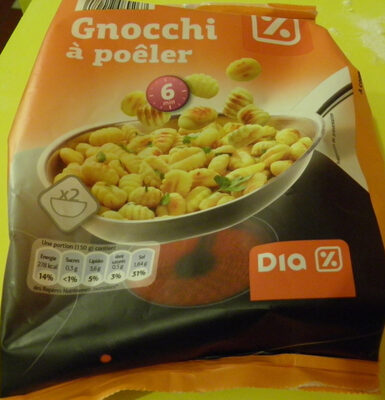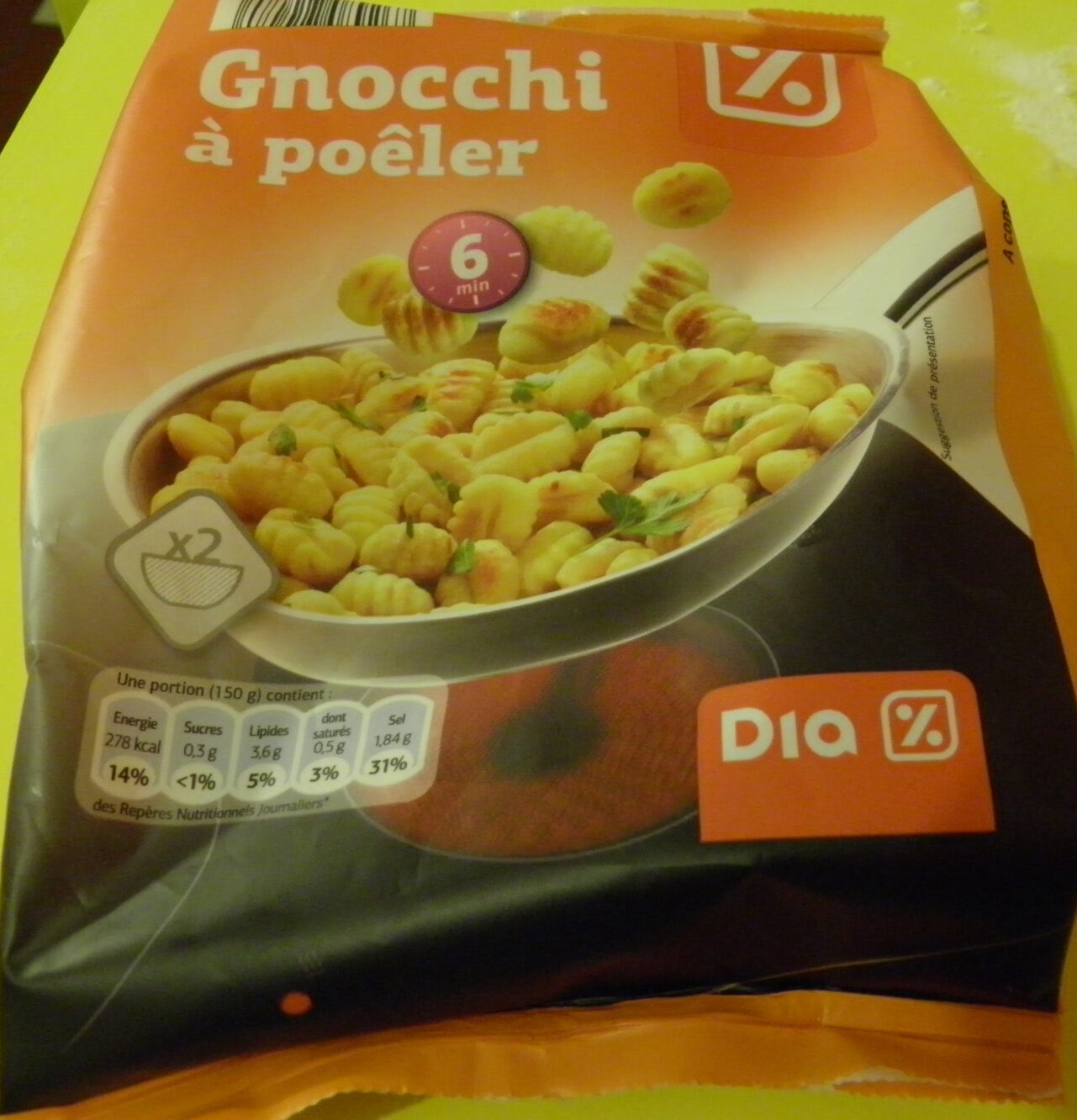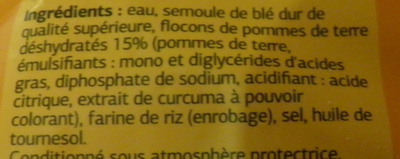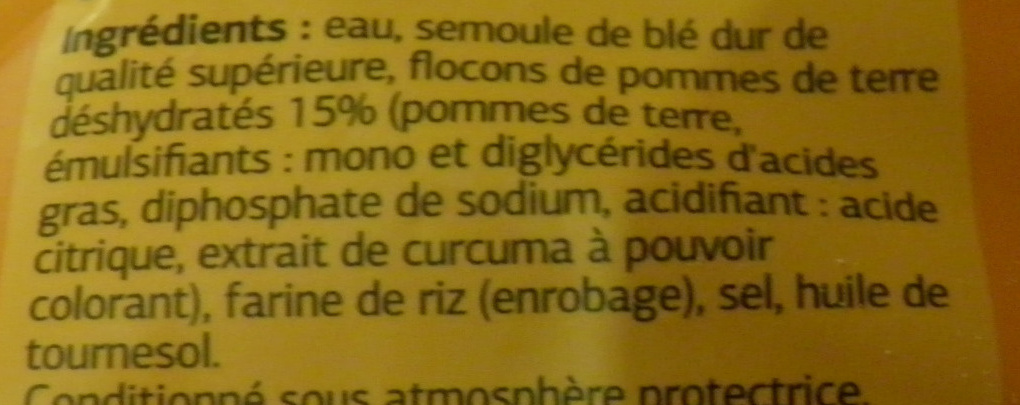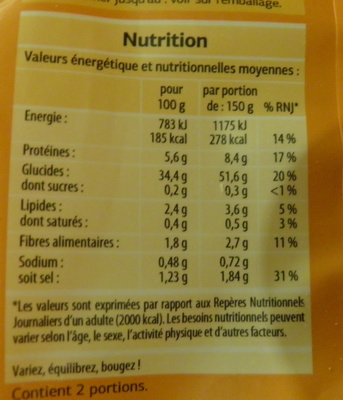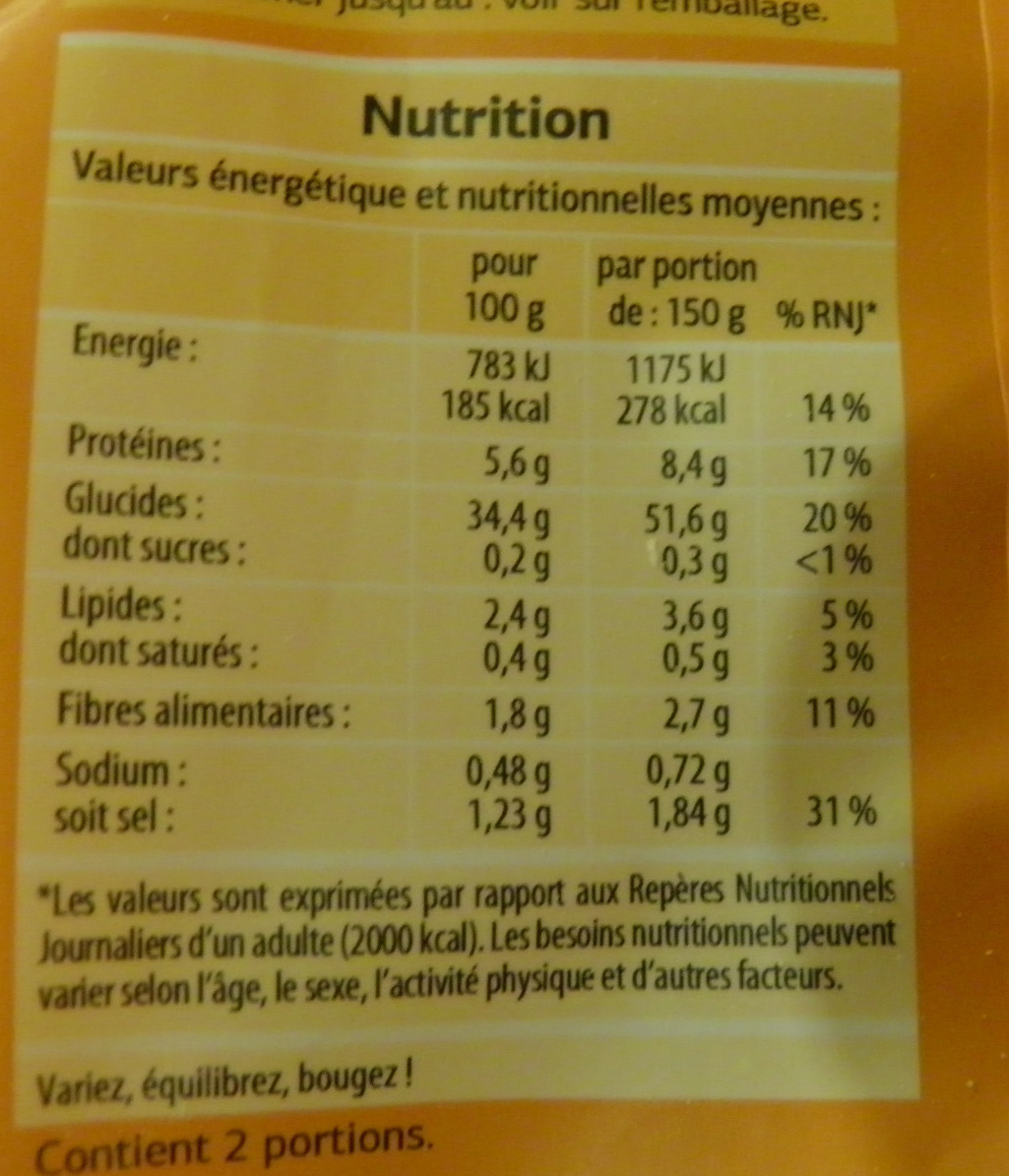Help us make food transparency the norm!
As a non-profit organization, we depend on your donations to continue informing consumers around the world about what they eat.
The food revolution starts with you!
Gnocchi à poêler - Dia - 300 g
Gnocchi à poêler - Dia - 300 g
This product page is not complete. You can help to complete it by editing it and adding more data from the photos we have, or by taking more photos using the app for Android or iPhone/iPad. Thank you!
×
Barcode: 8480017089267 (EAN / EAN-13)
Common name: Gnocchi à la semoule de blé dur et aux flocons de pommes de terre
Quantity: 300 g
Packaging: Fresh, Protective gas, fr:Sachet plastique
Brands: Dia
Categories: Plant-based foods and beverages, Plant-based foods, Cereals and potatoes, Cereals and their products, Meals, Fresh foods, Pastas, Fresh meals, Fresh pasta, Gnocchi, Potato gnocchi
Labels, certifications, awards: Made in France
Manufacturing or processing places: France
Stores: Dia
Countries where sold: France
Matching with your preferences
Health
Ingredients
-
14 ingredients
: Eau, semoule de blé dur de qualité supérieure, flocons de pommes de terre déshydratés 15 % (pommes de terre, émulsifiants : mono et diglycérides d'acides gras, diphosphate de sodium, acidifiant : acide citrique, extrait de curcuma à pouvoir colorant), farine de blé (enrobage), sel, huile de tournesol.Allergens: Gluten
Food processing
-
Ultra processed foods
Elements that indicate the product is in the 4 - Ultra processed food and drink products group:
- Additive: E100 - Curcumin
- Additive: E450 - Diphosphates
- Additive: E471 - Mono- and diglycerides of fatty acids
- Ingredient: Emulsifier
Food products are classified into 4 groups according to their degree of processing:
- Unprocessed or minimally processed foods
- Processed culinary ingredients
- Processed foods
- Ultra processed foods
The determination of the group is based on the category of the product and on the ingredients it contains.
Additives
-
E330 - Citric acid
Citric acid is a natural organic acid found in citrus fruits such as lemons, oranges, and limes.
It is widely used in the food industry as a flavor enhancer, acidulant, and preservative due to its tart and refreshing taste.
Citric acid is safe for consumption when used in moderation and is considered a generally recognized as safe (GRAS) food additive by regulatory agencies worldwide.
-
E450 - Diphosphates
Diphosphates (E450) are food additives often utilized to modify the texture of products, acting as leavening agents in baking and preventing the coagulation of canned food.
These salts can stabilize whipped cream and are also found in powdered products to maintain their flow properties. They are commonly present in baked goods, processed meats, and soft drinks.
Derived from phosphoric acid, they're part of our daily phosphate intake, which often surpasses recommended levels due to the prevalence of phosphates in processed foods and drinks.
Excessive phosphate consumption is linked to health issues, such as impaired kidney function and weakened bone health. Though diphosphates are generally regarded as safe when consumed within established acceptable daily intakes, it's imperative to monitor overall phosphate consumption to maintain optimal health.
-
E471 - Mono- and diglycerides of fatty acids
Mono- and diglycerides of fatty acids (E471), are food additives commonly used as emulsifiers in various processed foods.
These compounds consist of glycerol molecules linked to one or two fatty acid chains, which help stabilize and blend water and oil-based ingredients. E471 enhances the texture and shelf life of products like margarine, baked goods, and ice cream, ensuring a smooth and consistent texture.
It is generally considered safe for consumption within established regulatory limits.
Ingredients analysis
-
May contain palm oil
Ingredients that may contain palm oil: E471
-
Vegan status unknown
Unrecognized ingredients: fr:extrait-de-curcuma-a-pouvoir-colorantSome ingredients could not be recognized.
We need your help!
You can help us recognize more ingredients and better analyze the list of ingredients for this product and others:
- Edit this product page to correct spelling mistakes in the ingredients list, and/or to remove ingredients in other languages and sentences that are not related to the ingredients.
- Add new entries, synonyms or translations to our multilingual lists of ingredients, ingredient processing methods, and labels.
If you would like to help, join the #ingredients channel on our Slack discussion space and/or learn about ingredients analysis on our wiki. Thank you!
-
Vegetarian status unknown
Unrecognized ingredients: fr:extrait-de-curcuma-a-pouvoir-colorantSome ingredients could not be recognized.
We need your help!
You can help us recognize more ingredients and better analyze the list of ingredients for this product and others:
- Edit this product page to correct spelling mistakes in the ingredients list, and/or to remove ingredients in other languages and sentences that are not related to the ingredients.
- Add new entries, synonyms or translations to our multilingual lists of ingredients, ingredient processing methods, and labels.
If you would like to help, join the #ingredients channel on our Slack discussion space and/or learn about ingredients analysis on our wiki. Thank you!
-
Details of the analysis of the ingredients
We need your help!
Some ingredients could not be recognized.
We need your help!
You can help us recognize more ingredients and better analyze the list of ingredients for this product and others:
- Edit this product page to correct spelling mistakes in the ingredients list, and/or to remove ingredients in other languages and sentences that are not related to the ingredients.
- Add new entries, synonyms or translations to our multilingual lists of ingredients, ingredient processing methods, and labels.
If you would like to help, join the #ingredients channel on our Slack discussion space and/or learn about ingredients analysis on our wiki. Thank you!
: Eau, semoule de blé dur de qualité supérieure, flocons de pommes de terre déshydratés 15% (pommes de terre, émulsifiants (mono- et diglycérides d'acides gras), diphosphate de sodium, acidifiant (acide citrique), extrait de curcuma à pouvoir colorant), farine de blé (enrobage), sel, huile de tournesol- Eau -> en:water - vegan: yes - vegetarian: yes - ciqual_food_code: 18066 - percent_min: 25.0616 - percent_max: 70
- semoule de blé dur de qualité supérieure -> en:superior-quality-durum-wheat-semolina - vegan: yes - vegetarian: yes - ciqual_food_code: 9610 - percent_min: 15 - percent_max: 42.5
- flocons de pommes de terre déshydratés -> en:dehydrated-potato-flakes - vegan: yes - vegetarian: yes - ciqual_food_code: 4003 - percent_min: 15 - percent: 15 - percent_max: 15
- pommes de terre -> en:potato - vegan: yes - vegetarian: yes - ciqual_food_code: 4003 - percent_min: 3 - percent_max: 15
- émulsifiants -> en:emulsifier - percent_min: 0 - percent_max: 7.5
- mono- et diglycérides d'acides gras -> en:e471 - vegan: maybe - vegetarian: maybe - from_palm_oil: maybe - percent_min: 0 - percent_max: 7.5
- diphosphate de sodium -> en:e450i - vegan: yes - vegetarian: yes - percent_min: 0 - percent_max: 5
- acidifiant -> en:acid - percent_min: 0 - percent_max: 3.75
- acide citrique -> en:e330 - vegan: yes - vegetarian: yes - percent_min: 0 - percent_max: 3.75
- extrait de curcuma à pouvoir colorant -> fr:extrait-de-curcuma-a-pouvoir-colorant - percent_min: 0 - percent_max: 3
- farine de blé -> en:wheat-flour - vegan: yes - vegetarian: yes - ciqual_proxy_food_code: 9410 - percent_min: 0 - percent_max: 15
- enrobage -> en:coating - vegan: maybe - vegetarian: maybe - percent_min: 0 - percent_max: 15
- sel -> en:salt - vegan: yes - vegetarian: yes - ciqual_food_code: 11058 - percent_min: 0 - percent_max: 1.2192
- huile de tournesol -> en:sunflower-oil - vegan: yes - vegetarian: yes - from_palm_oil: no - ciqual_food_code: 17440 - percent_min: 0 - percent_max: 1.2192
Nutrition
-
Average nutritional quality
⚠ ️Warning: the amount of fruits, vegetables and nuts is not specified on the label, it was estimated from the list of ingredients: 0This product is not considered a beverage for the calculation of the Nutri-Score.
Positive points: 4
- Proteins: 3 / 5 (value: 5.6, rounded value: 5.6)
- Fiber: 1 / 5 (value: 1.8, rounded value: 1.8)
- Fruits, vegetables, nuts, and colza/walnut/olive oils: 0 / 5 (value: 0, rounded value: 0)
Negative points: 7
- Energy: 2 / 10 (value: 783, rounded value: 783)
- Sugars: 0 / 10 (value: 0.2, rounded value: 0.2)
- Saturated fat: 0 / 10 (value: 0.4, rounded value: 0.4)
- Sodium: 5 / 10 (value: 487.68, rounded value: 487.7)
The points for proteins are counted because the negative points are less than 11.
Nutritional score: (7 - 4)
Nutri-Score:
-
Nutrient levels
-
Fat in low quantity (2.4%)
What you need to know- A high consumption of fat, especially saturated fats, can raise cholesterol, which increases the risk of heart diseases.
Recommendation: Limit the consumption of fat and saturated fat- Choose products with lower fat and saturated fat content.
-
Saturated fat in low quantity (0.4%)
What you need to know- A high consumption of fat, especially saturated fats, can raise cholesterol, which increases the risk of heart diseases.
Recommendation: Limit the consumption of fat and saturated fat- Choose products with lower fat and saturated fat content.
-
Sugars in low quantity (0.2%)
What you need to know- A high consumption of sugar can cause weight gain and tooth decay. It also augments the risk of type 2 diabetes and cardio-vascular diseases.
Recommendation: Limit the consumption of sugar and sugary drinks- Sugary drinks (such as sodas, fruit beverages, and fruit juices and nectars) should be limited as much as possible (no more than 1 glass a day).
- Choose products with lower sugar content and reduce the consumption of products with added sugars.
-
Salt in moderate quantity (1.22%)
What you need to know- A high consumption of salt (or sodium) can cause raised blood pressure, which can increase the risk of heart disease and stroke.
- Many people who have high blood pressure do not know it, as there are often no symptoms.
- Most people consume too much salt (on average 9 to 12 grams per day), around twice the recommended maximum level of intake.
Recommendation: Limit the consumption of salt and salted food- Reduce the quantity of salt used when cooking, and don't salt again at the table.
- Limit the consumption of salty snacks and choose products with lower salt content.
-
-
Nutrition facts
Nutrition facts As sold
for 100 g / 100 mlCompared to: Potato gnocchi Energy 783 kj
(187 kcal)+12% Fat 2.4 g +83% Saturated fat 0.4 g +8% Carbohydrates 34.4 g +4% Sugars 0.2 g -89% Fiber 1.8 g -14% Proteins 5.6 g +33% Salt 1.219 g +7% Fruits‚ vegetables‚ nuts and rapeseed‚ walnut and olive oils (estimate from ingredients list analysis) 0 %
Environment
-
Eco-Score B - Low environmental impact
⚠ ️Select a country in order to include the full impact of transportation.The Eco-Score is an experimental score that summarizes the environmental impacts of food products.→ The Eco-Score was initially developped for France and it is being extended to other European countries. The Eco-Score formula is subject to change as it is regularly improved to make it more precise and better suited to each country.Life cycle analysis
-
Average impact of products of the same category: A (Score: 97/100)
Category: Gnocchi, from potato, raw
Category: Gnocchi, from potato, raw
- PEF environmental score: 0.09 (the lower the score, the lower the impact)
- including impact on climate change: 0.82 kg CO2 eq/kg of product
Stage Impact Agriculture
46.6 %Processing
1.7 %Packaging
23.9 %Transportation
18.1 %Distribution
9.6 %Consumption
0.0 %
Bonuses and maluses
-
Missing origins of ingredients information
Malus: -5
⚠ ️ The origins of the ingredients of this product are not indicated.
If they are indicated on the packaging, you can modify the product sheet and add them.
If you are the manufacturer of this product, you can send us the information with our free platform for producers.
-
Packaging with a medium impact
Malus: -10
Shape Material Recycling Impact Bag Plastic High
Eco-Score for this product
-
Impact for this product: B (Score: 79/100)
Product: Gnocchi à poêler - Dia - 300 g
Life cycle analysis score: 97
Sum of bonuses and maluses: -15
Final score: 79/100 (The score of products with non-recyclable and non-biodegradable packaging materials is capped at 79 (grade B).)
-
Carbon footprint
-
Equal to driving 0.4 km in a petrol car
82 g CO² per 100g of product
The carbon emission figure comes from ADEME's Agribalyse database, for the category: Gnocchi, from potato, raw (Source: ADEME Agribalyse Database)
Stage Impact Agriculture
34.2 %Processing
1.5 %Packaging
33.1 %Transportation
26.6 %Distribution
4.6 %Consumption
0.0 %
Packaging
-
Packaging with a medium impact
-
Packaging parts
Bag (Plastic)
-
Packaging materials
Material % Packaging weight Packaging weight per 100 g of product Plastic
-
Transportation
-
Origins of ingredients
Missing origins of ingredients information
⚠ ️ The origins of the ingredients of this product are not indicated.
If they are indicated on the packaging, you can modify the product sheet and add them.
If you are the manufacturer of this product, you can send us the information with our free platform for producers.Add the origins of ingredients for this product Add the origins of ingredients for this product
Report a problem
-
Incomplete or incorrect information?
Category, labels, ingredients, allergens, nutritional information, photos etc.
If the information does not match the information on the packaging, please complete or correct it. Open Food Facts is a collaborative database, and every contribution is useful for all.
Data sources
Product added on by hommedanslalune
Last edit of product page on by chevalstar.
Product page also edited by jacob80, manu1400, musarana, packbot, quentinbrd.
